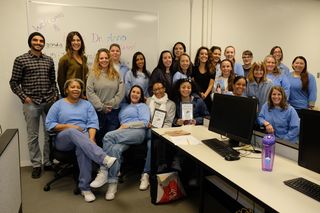Gratitude
How to Finally Find Your Purpose
A two-part formula for finding and living your purpose
Posted March 21, 2019
As those of you who follow me online may already know, I have been battling a rare form of ovarian cancer. (I created an animation describing my story and a number of posts sharing my research and alternative treatment protocols.) Thankfully, I've felt an outpouring of support, for which I am incredibly grateful."

But all of this attention — brought on by “undesirable” reasons — has repeatedly led me to ask the same question: “Why me?” To clarify: NOT “Why did this crappy thing happen to me,” but “Why am I deserving of help?” It’s not so much that I’m unable or unwilling to accept help, but I see it as a sort of cosmic call-to-action to be that much better to prove I am worthy of the generosity of others.
This question didn’t just briefly cross my mind. No, it keeps reverberating: Why should my life be saved? Why should so many resources be allocated to MY life? What is it I’m fighting for?
Perhaps that all sounds a bit nihilistic or self-loathing. I don’t see it as either. I think moments like this — hardship, coupled with external generosity — lead us to re-examine our purpose. What am I here to do? Have I achieved it yet? And if I am permitted to keep breathing and doing, how can I pay it back?
I can’t say for certain if or how the universe is keeping score, but I am. And I’m a bit of a hard-ass. So I have high expectations for myself.
If you have children or others who rely on you for basic support on a daily basis, some of that quest for purpose is likely answered. “I’m here to love and support my children.” But if you don’t have children, or if they alone do not fully answer your need for purpose, then defining and actualizing it is a bit more complicated — as it is for me.
I’m certainly not the first, nor will I be the last, to contemplate my reason for continuing to exist. Such is the existential human experience (which some of us, perhaps, unfortunately, are more prone to obsess over). But while I’ve always considered my path in relation to some larger good, it feels more pertinent now than ever.
My logic — for better or worse — goes something like this:
If I am allowed to survive and operate in a relatively healthy state, then I must dedicate my life to being of service.
That is the cosmic bargain I believe I am making. It’s that simple.
That’s not to say I have lived a life with a blind eye to service thus far. I joined the Peace Corps after college, I currently lead seminars for incarcerated and post-release men and women, and I think it’s safe to say no one ever became a teacher or an academic “for the money.” Nonetheless, I feel I now must become even more hyper-focused on maximizing my contribution, for however many days I remain here. We don’t ever know how long that will be — but regardless of that mystery timeline, I want to feel at peace with what I accomplished.
“Accomplished.” What a complicated word. Accolades, degrees, fame — I’m not talking about any of that, though they are all arguably accomplishments in their own right. I’m specifically referring to service-oriented, purpose-led accomplishments. Something far more challenging to calculate.
So where to begin?
Honestly, it’s daunting. If you go down the comparison rabbit-hole, you will never measure up to other people (or your perception of other people; an important distinction). Quantifiable metrics are another possible direction, but they also fall short of measuring your full contribution.
Pretty much every guru (and aspiring guru) out there has something to say about our search for meaning and purpose. There’s the Japanese concept of ikigai, which locates purpose at the intersection of what you love, what you’re good at, what the world needs, and what you can be paid for. Other directives include “follow your heart,” “turn wounds into healing for others,” “be grateful” — amongst countless other supposed keys to unlocking your purpose and as a result, your fulfillment.
All of that sounds great. BUT —
1) What does that look like in action?
and
2) How do you know it’s enough?
Let’s try to break those suggestions down into something practical and tangible:
Following my heart….leads me into nature, toward creative expression, and (fittingly) toward giving and receiving love, in all its many manifestations. Beautiful...but vague.
Gratitude….is a never-ending list for me. And while a regular gratitude practice is central to my life, it doesn’t fulfill my quest for the purpose (others may have a different experience, but it falls short in revealing specific answers for me).
Turning wounds into healing for others gets me a little closer to where to find and channel my purpose. It’s a combination of childhood wounds, health-related challenges, and the scars we acquire and accumulate simply through days lived. Where we suffer the most, we have the greatest opportunity to contribute. So perhaps wounds and suffering are the logical starting point for naming your purpose? But does that mean I should serve others whose experiences mirror mine? Perhaps, but it still feels like there’s a piece of the puzzle missing.
The ikigai approach, that intersection of what I love/am good at/the world needs/I can be paid for leads me to…(drumroll, please)...WHAT I’M ALREADY DOING.
Welp. That’s kind of anticlimactic.
And more importantly, it still doesn’t feel BIG enough to be worthy of all the time, energy, and resources currently being pumped into maintaining my existence. Maybe I’m just way too hard on myself. Or maybe there’s another way of looking at this.
Let’s go back to my central question: What am I here for?
It’s a question we all wrestle with. Confronting your own mortality merely puts it front and center. Ask anyone who’s cheated death at some point in their life: their outlook and perspective is almost always different. The lens through which you operate and view the world forever shifts after a trauma, and there’s no going back. But where does it lead you?
After trying — and failing — to answer this question through many different angles, I’ve found that it’s most satisfyingly addressed through this equation:
Purpose = Simplicity + Specificity
For me, the simplicity part of the purpose equation boils down to one word: Service. It’s the word that most aptly encompasses why I think I’m here, and it’s intentionally broad. The specificity part led me to write down what that looks like — not with numbers or names or a daily to-do list, but by describing the principles that will guide me.
So I created my own Purpose Manifesto:
- My purpose is to SERVE. Everything else is secondary.
- I’m here to do the most good for the most people, as often as possible.
- A life of service does NOT mean I am a doormat or that I will serve anyone and everything. Discretion and integrity are key.
- My expression of service can and will evolve over time. One moment it might serve a specific person, other times it will benefit a larger cause or people I’ve never met. But I will not get caught up in quantification, nor will I lose sight of the ripple effect that touching one person can have.
- I recognize that service to others must also include service to self. The healthier and happier I am, the more I can serve.
- I understand that monetization and service are not at odds. It’s ok to be paid (and paid well) for the gifts you share. It’s also valuable to know when to pay it forward.
- A life of service is not a life without wants and desires. I am a whole person.
- Each day is a gift: an opportunity to serve better than yesterday. I will not squander that gift.
- No matter what I do to serve, I recognize that it will never feel like enough. So as long as I reflect, look for more opportunities to grow, and do everything in my power to put that plan into action, it is always enough. Repeating that process indefinitely is my metric for success.
Regardless of where you are in your life, I encourage you to follow this two-step process for identifying and actualizing your purpose:
Simplicity
(word/phrase that recurs for you and broadly captures what you're here for)
+
Specificity
(guiding principles you will follow on your quest to actualizing it)
Your simple word or phrase may be “creativity” or “love” — trust your instinct. Consider sharing your purpose manifesto with your loved ones or colleagues, or just write it for yourself and reread it when you start to feel lost or disheartened.
Can your word or manifesto change? Sure. There are no rules here. But my hunch is with this two-step process, it likely won’t change much over time.
I invite you to share the results of your purpose formula in the comments — I’d love to read and feel inspired by them.




